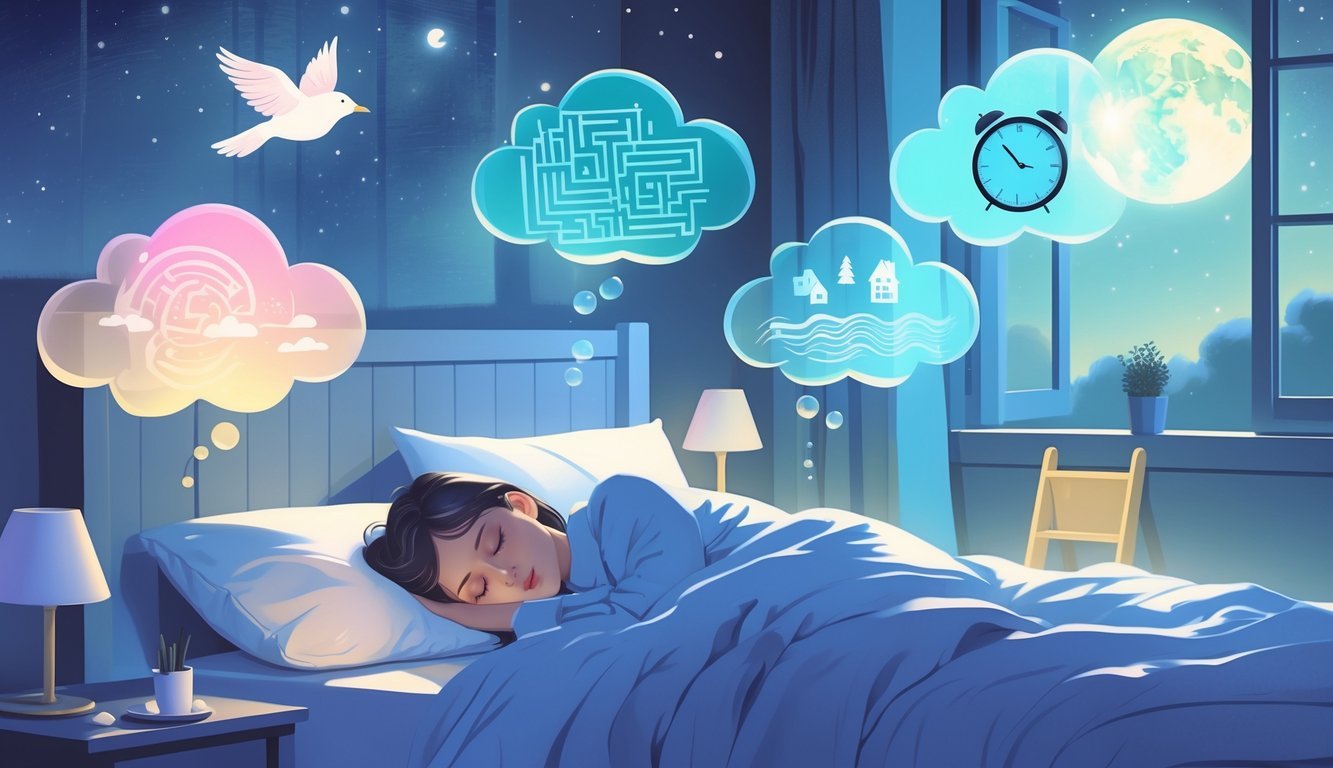PsychNewsDaily Publishers
100 Summit Drive
Burlington, MA, 01803
Telephone: (320) 349-2484
PsychNewsDaily Publishers
100 Summit Drive
Burlington, MA, 01803
Telephone: (320) 349-2484
Dreams often reflect subconscious feelings, fears, and desires, with common themes like being chased, falling, or flying revealing insights into personal emotions and life changes.

Dreams can feel pretty weird sometimes, right? Still, most of us notice they tend to follow certain patterns.
A lot of people find themselves dreaming about being chased, falling, flying, or even facing death. These aren’t just random images; they often reflect your feelings, fears, or hopes in real life.
When you start to understand what these common dream symbols mean, you can make more sense of your subconscious thoughts. Maybe your dreams are nudging you about stress, desires, or changes happening around you.
Learning to interpret these dreams can help you get a better grip on yourself and your emotions. Not everyone’s dreams are the same though, and their meanings can shift depending on what’s going on in your life.
But knowing a few classic dream themes gives you a place to start when you’re trying to figure out your own nightly stories.

Dreams have a sneaky way of reflecting your feelings and worries. Sometimes they show your fears about failing, being vulnerable, or losing control.
When you get a handle on these common symbols and themes, you can pick up some useful insight into what’s really on your mind.
If you dream about being chased, you’re probably avoiding something in your real life. Maybe it’s a problem, a responsibility, or your own feelings—fear, stress, you name it.
The person or thing chasing you stands in for whatever’s pressuring you. Being chased often connects to anxiety about change or fear of failure.
You might feel like something’s “catching up” to you, or just overwhelmed in general. Notice who (or what) is chasing you; it might help you figure out what’s causing your stress.
Dreams about falling are super common and usually tie back to a loss of control. You might feel unsafe or on shaky ground about something in your life.
This could be about emotions, money, or even your own self-confidence. These dreams can also highlight your fear of failing or messing up.
Falling in a dream isn’t usually about real danger. It’s more about how you’re handling uncertainty.
Try thinking about which parts of your life feel unstable or uneasy right now.
When your teeth fall out in a dream, it often points to feelings of vulnerability. Teeth are a symbol of strength and how you present yourself to others.
Losing them might mean you’re worried about how you look or how people see you. This dream can also connect to your sense of identity and personal insight.
Maybe you’re going through a big change or a period of self-reflection. These dreams ask you to check in with yourself and think about how you’re handling challenges.
Dreams where you’re naked in public usually show vulnerability and anxiety about being exposed. You might feel unprepared, embarrassed, or scared that people will notice your flaws.
This dream can pop up when you worry about being judged or fitting in. Sometimes it points to a fear of change or stepping outside your comfort zone.
It’s a good time to think about where you feel most vulnerable and how you could build up your confidence. Being naked in a dream? That’s your mind nudging you to reflect a little.

Some dreams put your hidden feelings or ideas right in front of you. They can reveal your fears, hopes, or the changes you’re facing.
If you pay attention, these dreams might help you get to know yourself a bit better.
Flying dreams usually bring a sense of freedom and control. If you’re flying with ease, maybe you feel powerful or free in your waking life.
But if flying feels tough or scary, it could mean you’re worried or feeling unsafe. Sometimes these dreams tie into lucid dreaming, where you realize you’re dreaming and can steer the flight yourself.
Flying also works as a symbol of transformation—maybe you’re aiming for new goals or wanting to break free from limits. Keeping a dream journal can help you remember flying dreams and spot patterns in what makes you feel free or stuck.
Dreams about pregnancy or being pregnant often hint at new beginnings or personal growth. Maybe you’re starting something new or going through a change.
These dreams invite self-reflection on what you’re “creating” or developing. Pregnancy dreams can also dig into your subconscious mind, showing hopes or fears about changes.
For some, it’s about the transformation they want to make or feel is happening inside. Writing down these dreams can boost your dream recall and help you see which changes matter most to you.
Dreams about death aren’t always about someone actually dying. More often, they mean a transformation or the end of one chapter so a new one can begin.
You might feel anxious about changes or like you’re losing control. Freud thought death dreams connect to your unconscious mind working through fears and the cycle of life.
They tend to be pretty vivid and emotional, making you wonder what parts of your life might need to shift. If you keep having these dreams, try to notice what you’re letting go of or what you’re afraid to lose.
Sometimes, it’s just your mind’s way of nudging you toward personal insight.
Dreams about school or taking exams usually point to stress or worry about being judged. They can reflect anxiety about change or feeling unprepared for challenges ahead.
Maybe you’re struggling in a test-taking dream, which shows your fears around success or failure. This is common if you’re under pressure or facing new demands in real life.
School dreams can also shine a light on your inner critic or doubts about your abilities. Use them as a chance to look at what you think you need to prove—to yourself or others—when things get tough.

Dreams about falling, being chased, or flying often connect to feelings of control, fear, or freedom. Water and teeth dreams tend to link with emotions and personal change.
Taking a test in a dream usually ties back to stress or self-evaluation.
Falling in a dream usually means you feel out of control or insecure in some part of your life. Sometimes it’s a sign you’re afraid of failing or losing something important.
Dreams of being chased usually mean you’re avoiding a problem or feeling threatened by something. It might reflect stress or anxiety you’re dealing with.
Flying dreams often show a desire for freedom or escape. They can also point to confidence and a sense of power in your goals.
Water in dreams usually points to emotions and feelings. Calm water might mean you feel at peace, but rough or dirty water could signal stress or confusion.
Losing teeth in dreams can relate to worries about how you look or getting older. It might also show feelings of helplessness or losing control.
Dreams about taking a test usually pop up when you feel pressure or think someone’s judging you.
They might show that you want to prove something to yourself—or maybe you’re just worried about measuring up.